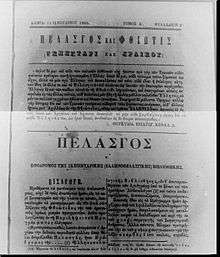Anastas Byku
Anastas Byku (died 1878) was a 19th-century Albanian publisher and journalist.[2] His publication of the Pelasgos newspaper in 1861 in both Albanian and Greek languages is considered to be one of the first publications of a periodical in Albanian. His endeavor was short-lived but he tried again in 1878 with another newspaper, Promytheus o Pelasgos, this time exclusively in the Greek language. Byku held that the Albanians were descendants of the Pelasgians and the Illyrians, and were one single people, although they were of different religious faiths; still according to him they should be inseparable from the Greek nation: this idea would eventually estrange him from the activists of the Albanian National Awakening.
Anastas Byku | |
|---|---|
| Born | 1830[1] |
| Died | 1878 |
| Occupation | Journalist |
Life

Byku, signing his publications as Anastasios Pykaios (Greek: Αναστάσιος Πυκαίος), was born in Lekël, an Albanian village in the district of Tepelenë, then part of the Ottoman Empire but now in modern Albania.[3] After finishing the Zosimea Greek language school in Ioannina, he started to work as a teacher in various Greek schools and as a journalist.[4] In 1861–1862 in Lamia, Greece, where he was living at that time, he started to publish one of the first Albanian newspapers Pelasgos (English: The Pelasgian): the newspaper lasted only one year.[5] The periodical was written in Albanian with an adapted Greek alphabet and in Greek. At the same time he published a primer textbook in Albanian called Gramë për shqipëtarët (English: Grammar for Albanians). In 1878, his last year of life, he tried to publish another newspaper, this time only in Greek, the Promytheus o Pelasgos (English: Prometheus the Pelasgian), but without much success.[6]
Byku deemed that it was important that the Albanians closely lived in peace with the Greek nation and both nations should be inseparable. Moreover, he noted that the Albanians and the Greeks share the same ancient origins and have to deal with common enemies. Byku also asserted that the Albanian language is a dialect of the Greek language.[4] For this his ideas were strongly rejected by a number of Albanian nationalists, such as Thimi Mitko, who saw the Albanian nation as completely separate from the Greek one.[7] Byku in his work Ελληνισμός και Χριστιανισμός (Hellenism and Christianity) claimed that the three enemies of the Greek nation are: Western Europeans, Bulgarians and Muslims.[4]
References
- Telegraf, Gazeta. "Anastas Byku, "Mësues, publicist dhe ideolog i Rilindjes Kombëtare"". Gazeta Telegraf. Retrieved 2 March 2018.
- Clayer, Nathalie (2007). Aux origines du nationalisme albanais: la naissance d'une nation majoritairement musulmane en Europe. KARTHALA Editions. pp. 154, 191–8. ISBN 978-2-84586-816-8. Retrieved 19 April 2011.
- "Τα δε χοριά της Λιντζουριάς είναι Αλβανοί χριστιανοί, ομοίως και Ζαγοριάς όλοι χριστιανοί Αλβανοί, αρχίζοντας από Σέπερην, το μεγαλύτερων χορίων της. Η δε Ρίζα περιέχει τα χωριά Πέστανη, Κόδρα, Λέκλη, Λάμποβον, Χόρμοβο, Ειρήντι και εξής, Αλβανοί χριστιανοί, ανδρείοι εις τους πολέμους." Κοσμά Θεσπρωτού και Αθανασίου Ψαλίδα: Γεωγραφία Αλβανίας και Ηπείρου εξ ανεκδότου χειρογράφου του Κοσμά Θεσπρωτού, με τοπογραφικά σχεδιογραφήματα και γεωγραφικούς χάρτας του ιδίου, προλεγόμενα και σημειώσεις Αθαν. Χ. Παπαχαρίση, Ιωάννινα 1964, σελ. 65.
- Zelepos, Ioannis (2002). Die Ethnisierung griechischer Identität, 1870-1912: Staat und private Akteure vor dem Hintergrund der "Megali Idea". Oldenbourg Wissenschaftsverlag. p. 94. ISBN 978-3-486-56666-6.
- Aux origines du nationalisme albanais: la naissance d'une nation majoritairement musulmane en Europe Author Nathalie Clayer Publisher KARTHALA Editions, 2007 ISBN 2-84586-816-2, ISBN 978-2-84586-816-8 p. 154
- Rreth ALFABETIT Të Shqipes Author Xhevat Lloshi Publisher Logos-A, 2008 ISBN 9989-58-268-8, ISBN 978-9989-58-268-4 pp. 170–171
- Islami, Selim (1984). Historia e Shqiperise (in Albanian). vol. 2, part 4. Academy of Sciences of Albania. p. 145.
Further reading
- Αναστασίου Ι. (Μ)πυκαίου. Ελληνισμός και Χριστιανισμός, [Hellenism and Christianity] 1874. (in Greek)